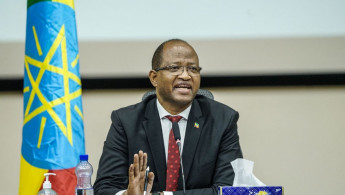Ethiopia says government team on way to rebel-held Tigray region
A high-level Ethiopian team was on its way on Monday to the capital of the rebel-held Tigray region for talks on implementing a peace deal to end over two years of conflict.
Addis Ababa and Tigray's rebel forces have agreed to create a joint monitoring body to ensure the November peace deal to end the brutal war is respected by all sides.
Among the terms of the agreement was a provision to establish a monitoring and compliance mechanism so that both sides could be confident the truce was being honoured, and any violations addressed.
Tens of thousands have died in two years of bloodshed in Tigray.
"The delegation is the first of its stature as a high-level federal government body heading to Mekele in two years," a statement said, adding that it was led by House of Representatives speaker Tagesse Chafo.
The aim is to supervise the application of the peace deal signed on 2 November.
The agreement provides for the disarmament of rebel forces, the re-establishment of federal authority in Tigray and the reopening of access to the region.
"This gesture is an attestation to the peace agreement getting on the right track and progressing," the statement said.
Estimates of casualties vary widely, with the United States saying that as many as half a million people have died, while the European Union's top diplomat, Josep Borrell, says more than 100,000 people may have been killed.
The war began in November 2020 when Prime Minister Abiy Ahmed sent troops into Tigray after accusing the Tigray People's Liberation Front (TPLF), the ruling party in the region, of attacking army bases.
Tedros Adhanom Ghebreyesus, the head of the World Health Organization, said Wednesday that his uncle had been "murdered" by Eritrean troops in Ethiopia's war-torn northern Tigray region...https://t.co/gblz346kn8
— The New Arab (@The_NewArab) December 15, 2022
All sides to the conflict have been accused of possible war crimes by UN investigators, and the US has warned ethnic cleansing may have occurred in western Tigray.
Aid has started trickling back into Tigray since the peace deal was signed in November, going some way to alleviating dire shortages of food, fuel, cash and medicines.
But the region of six million is still largely without electricity and phone lines, while internet and banking services have only partly been restored.
Pro-government forces – specifically troops from Eritrea to the north, and militias from the Ethiopian region of Amhara – are not mentioned in the peace deal but remain in Tigray and have been accused of abuses.





 Follow the Middle East's top stories in English at The New Arab on Google News
Follow the Middle East's top stories in English at The New Arab on Google News


